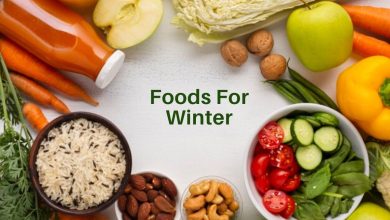What type of food we eat in winter season? What are the benefits of winter food?
winter season
What type of food we eat in winter season?
People frequently choose to consume substantial, comforting dishes in the winter because they help them stay warm and comfortable. Following are some examples of foods that people frequently eat in the winter:
Root vegetables are in season and frequently used in filling stews, soups, and roasted dishes.
Examples include carrots, potatoes, sweet potatoes, and turnips.
Warm soups and stews are common selections during the winter. Various components, like lentils, beans, pork, or chicken, can be used to make them. Classics like chili and chicken noodle soup are frequently consumed.
Warm beverages: In chilly weather, warm drinks like hot chocolate, tea, coffee, and mulled wine are soothing. They may also aid in retaining your internal heat.
Citrus Fruits: During the winter, citrus fruits such as oranges, grapefruits, and clementines are in season and offer a dosage of vitamin C that can help strengthen the immune system.
Winter Greens: Leafy greens like kale, collard greens, and Swiss chard can be used in salads or prepared dishes and flourish in cooler climates.
Squash: In the winter, it’s easy to get varieties like butternut, acorn, and spaghetti squash that can be baked, pureed, or added to casseroles.
Comfort Foods: Hearty and soothing foods like macaroni and cheese, pot pies, lasagna, and meatloaf are perfect for the winter.
Baked goods: People make extra pies, cookies, cakes, and bread in the winter to enjoy at home or to share with friends throughout the holiday season.
Roasted meats: During the winter, holiday feasts and parties frequently include roasted meats such turkey, ham, and roasts.
Spices: To give flavor and warmth to winter foods and pastries, warm spices like cinnamon, nutmeg, cloves, and ginger are frequently employed.
Nuts: In winter recipes, salads, and desserts, nuts like almonds, walnuts, and chestnuts are frequently used.
Oatmeal & Porridge: In the winter, a warm bowl of oatmeal or another grain-based porridge can be a cozy and wholesome breakfast alternative.
Casseroles: Casseroles are easy one-dish meals that are great for warming up in the oven and can be modified with a variety of ingredients.
A healthcare professional or nutritionist can give you with tailored guidance on your winter diet because everyone has different nutritional demands and preferences.
The kinds of foods eaten throughout the winter may change from location to place due to regional and cultural differences in dietary preferences. A healthy diet must also be followed year-round to guarantee that your body is receiving all the nutrients it requires.

What are the benefits of winter food?
Numerous advantages of winter foods can assist your health and wellbeing throughout the chilly months. Among these advantages are:
Warming Qualities: In cold weather, many winter foods, such as soups, stews, and hot beverages, include warming Qualities that assist in maintaining body warmth.
Rich in nutrients: Winter vegetables such as citrus fruits, leafy greens, and root vegetables are abundant in important vitamins and minerals. They can offer vitamin C to strengthen your immune system and vitamin A to support eye health, for instance.
Comfort and Satiety: Hearty comfort foods like casseroles, roasted meats, and baked goods can give a feeling of comfort and contentment, which is particularly appreciated during the shorter, dreary winter days.
Hydration: Winter dishes like stews and soups frequently have a lot of liquid in them. When you might not be drinking as much water owing to the chilly weather, this can help keep you hydrated.
Dietary fiber is abundant in winter meals including whole grains, root vegetables, and legumes. Fiber promotes a sensation of fullness and supports digestive health, both of which may aid in weight management.
Winter foods provide for a change in diet and seasonally-appropriate variety. Your nutrient intake can be diversified by consuming a wide variety of seasonal produce.
Immunity Boosters: During the cold and flu season, it’s crucial to have a strong immune system, which is why several winter foods, such citrus fruits and garlic, can aid.
Supporting Energy Levels: Winter meals high in carbohydrates, such as potatoes, grains, and oats, give you long-lasting energy, keeping you warm and active.
Mood balancing: During the gloomier and colder winter days, comfort foods can lift your spirits and offer emotional solace.
Bone strengthening: Dairy items like milk and cheese, which are frequently used in winter dishes, are a good source of calcium and vitamin D, both of which are crucial for strong bones.
Winter foods frequently play a part in cultural and familial traditions, creating a sense of togetherness and kinship.
Winter foods can provide these advantages, but it’s vital to keep in mind that moderation and balance are key. Maintaining a well-rounded diet that includes a variety of foods from all food categories is also crucial if you want to make sure you obtain a variety of nutrients throughout the year.
A healthcare professional or nutritionist can give you with tailored guidance on your winter diet because everyone has different nutritional demands and preferences.



